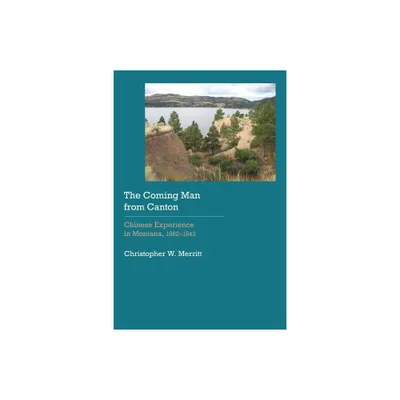Home
The Coming Man from Canton: Chinese Experience Montana, 1862-1943
Loading Inventory...
Barnes and Noble
The Coming Man from Canton: Chinese Experience Montana, 1862-1943
Current price: $65.00


Barnes and Noble
The Coming Man from Canton: Chinese Experience Montana, 1862-1943
Current price: $65.00
Loading Inventory...
Size: Hardcover
*Product Information may vary - to confirm product availability, pricing, and additional information please contact Barnes and Noble
In
The Coming Man from Canton
Christopher W. Merritt mines the historical and archaeological record of the Chinese immigrant experience in Montana to explore new questions and perspectives. During the 1860s Chinese immigrants arrived by the thousands, moving into the Rocky Mountain West and tenaciously searching for prosperity in the face of resistance, restriction, racism, and armed hostility from virtually every ethnic group in American society. As second-class citizens, Chinese immigrants remained largely insular and formed their own internal governments as well as labor and trade networks, typically establishing communities apart from the main towns. Chinese miners, launderers, restaurant keepers, gardeners, railroad laborers, and other workers became a separate but integral part of the American experience in the Intermountain West.
Although Chinese immigrants constituted more than 10 percent of the Montana Territory's total population by 1870, the historical records provide a biased and narrow perspective, as they were generally written by European American community members. Merritt uses the statewide Montana context to show the diversity of Chinese settlements that has often been neglected by archival studies. His research highlights how the legacy of the Chinese in Montana is, or is not, reflected in modern Montana identity and how scholars, educators, professionals, and the public can alter the existing perception of this population as the "other" and perceive it instead an integral part of Montana's past.
The Coming Man from Canton
Christopher W. Merritt mines the historical and archaeological record of the Chinese immigrant experience in Montana to explore new questions and perspectives. During the 1860s Chinese immigrants arrived by the thousands, moving into the Rocky Mountain West and tenaciously searching for prosperity in the face of resistance, restriction, racism, and armed hostility from virtually every ethnic group in American society. As second-class citizens, Chinese immigrants remained largely insular and formed their own internal governments as well as labor and trade networks, typically establishing communities apart from the main towns. Chinese miners, launderers, restaurant keepers, gardeners, railroad laborers, and other workers became a separate but integral part of the American experience in the Intermountain West.
Although Chinese immigrants constituted more than 10 percent of the Montana Territory's total population by 1870, the historical records provide a biased and narrow perspective, as they were generally written by European American community members. Merritt uses the statewide Montana context to show the diversity of Chinese settlements that has often been neglected by archival studies. His research highlights how the legacy of the Chinese in Montana is, or is not, reflected in modern Montana identity and how scholars, educators, professionals, and the public can alter the existing perception of this population as the "other" and perceive it instead an integral part of Montana's past.

















